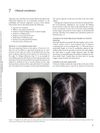
The document concludes that dermatology training and grading scales need to better represent dark-skinned individuals to improve diagnosis and assessment of skin conditions.
 1 citations,
July 2012 in “Nasza Dermatologia Online”
1 citations,
July 2012 in “Nasza Dermatologia Online” IL-1α levels are higher in alopecia areata patients, suggesting a role in the disease.
[object Object]  1 citations,
April 2012 in “Informa Healthcare eBooks”
1 citations,
April 2012 in “Informa Healthcare eBooks” The conclusion is that detailed clinical descriptions help pathologists diagnose hair loss conditions more accurately.
 1 citations,
February 2004 in “Medical Hypotheses”
1 citations,
February 2004 in “Medical Hypotheses” Certain cultural hair practices might cause baldness by affecting natural hair oils and stem cell delivery to hair follicles.
 1 citations,
May 1965 in “Medical Clinics of North America”
1 citations,
May 1965 in “Medical Clinics of North America” Hair growth dysfunction involves various conditions with limited treatment options.
 December 2024 in “Asian Journal of Pharmaceutical and Clinical Research”
December 2024 in “Asian Journal of Pharmaceutical and Clinical Research” Combining synthetic and herbal treatments may help with hair loss, but more research is needed.
 December 2024 in “Australian Journal of General Practice”
December 2024 in “Australian Journal of General Practice” The woman's hair loss pattern doesn't match typical conditions like alopecia areata or female pattern hair loss.
 August 2024 in “Life Science Alliance”
August 2024 in “Life Science Alliance” Helminth protein helps wounds heal better by reducing scarring and promoting tissue growth.
 August 2024 in “UPI Journal of Pharmaceutical Medical and Health Sciences”
August 2024 in “UPI Journal of Pharmaceutical Medical and Health Sciences” PRP shows promise in musculoskeletal rehabilitation but needs standardized reporting for better outcomes.
 July 2024 in “Plastic and Aesthetic Research”
July 2024 in “Plastic and Aesthetic Research” Careful planning and accurate diagnosis are crucial for successful hair restoration surgery.
 July 2024 in “Dermatology and Therapy”
July 2024 in “Dermatology and Therapy” Darker hair colors may increase the risk of alopecia areata, while lighter hair colors may decrease it.
 May 2024 in “International Journal For Multidisciplinary Research”
May 2024 in “International Journal For Multidisciplinary Research” The herbal hair cream helps protect and improve hair health.

New treatments for skin conditions show promise, especially Coacillium® for hair growth in young people with alopecia areata.

Improved nutrition quickly healed the patient's skin lesions.
 March 2024 in “Asian journal of beauty & cosmetology”
March 2024 in “Asian journal of beauty & cosmetology” Derma Genie™-H001 can help prevent hair loss and promote hair growth.
 March 2024 in “Research Square (Research Square)”
March 2024 in “Research Square (Research Square)” Sex steroids affect the MafB gene differently in male and female hamsters.
 February 2024 in “International Journal For Multidisciplinary Research”
February 2024 in “International Journal For Multidisciplinary Research” Nanostructured lipid carriers are effective for treating hyperpigmentation in women aged 30-40.
 February 2024 in “PloS one”
February 2024 in “PloS one” Tofacitinib and adalimumab are promising treatments for cicatricial alopecia with few side effects.
 January 2024 in “Regenerative Biomaterials”
January 2024 in “Regenerative Biomaterials” Dissolvable microneedles with Ginsenoside Rg3 can help treat hair loss by improving drug delivery and stimulating hair growth.
 November 2023 in “Indian journal of surgery”
November 2023 in “Indian journal of surgery” Platelet-rich gel is an effective treatment for healing scalp wounds with exposed skull.
 November 2023 in “European medical journal. Dermatology”
November 2023 in “European medical journal. Dermatology” Early diagnosis and new treatments are crucial to prevent permanent hair loss in scarring alopecia.
 November 2023 in “bioRxiv (Cold Spring Harbor Laboratory)”
November 2023 in “bioRxiv (Cold Spring Harbor Laboratory)” Disrupted cholesterol production impairs hair follicle stem cells, leading to hair loss.
 October 2023 in “European medical journal. Dermatology”
October 2023 in “European medical journal. Dermatology” Hair loss greatly affects quality of life, and dermatologists are crucial for proper diagnosis and treatment.
[object Object] 
There are many treatments for common hair loss, but more trials are needed to decide which are best.
 March 2023 in “Revista română de reumatologie”
March 2023 in “Revista română de reumatologie” Skin problems are common in lupus, often appearing first, with various types and treatments, and careful monitoring is important for diagnosis and management.
 March 2023 in “Journal of clinical review & case reports”
March 2023 in “Journal of clinical review & case reports” Frontal Fibrosing Alopecia mainly affects postmenopausal Mexican women, requiring early detection to prevent permanent hair loss.
 January 2023 in “Fundamental toxicological sciences”
January 2023 in “Fundamental toxicological sciences” Mozuku seaweed fucoidan can inhibit harmful skin bacteria growth.
 January 2023 in “European endocrinology”
January 2023 in “European endocrinology” People with alopecia have a higher risk of thyroid cancer.
 May 2022 in “Acta scientific dental sciences”
May 2022 in “Acta scientific dental sciences” Platelet concentrates are useful for tissue repair in medicine and dentistry, with L-PRF showing promising results in various treatments.
 April 2021 in “Advances in Cosmetic Surgery”
April 2021 in “Advances in Cosmetic Surgery” Hair restoration can be achieved through non-surgical treatments like minoxidil, antiandrogens, phototherapy, and PRP procedures, or through surgical methods like hair transplantation. Continued treatment is needed to maintain results, and full results are visible after 12-18 months.






























